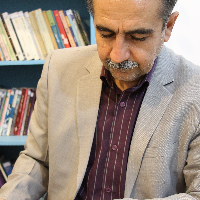Symbolism and social allegories of Hafez in the expression and thought of Ebtehaj (contemporary poet)
Ebtehaj's social thought and concerns in connection with his literary aesthetic taste and his attachment to classical lyric poetry, especially Hafez's lyric poems, as well as the inflammatory political arena of the 1930s, gave him the color and smell of his words and poetry. He distinguishes himself as "Fereydoun Tavaloli" and "Rahi Moayeri". Ebtehaj, who is a lyric poet, has also shown his ability in modern poetry, but the poet's aesthetic taste has enabled him to compose lyric poems that follow Hafez in various dimensions, Allegories, including employing vocabulary and interpretations, intellectual themes and syntactic construction. The present research method is qualitative and descriptive. In this study, shadow lyric poems from the "Black Exercise" poetry book have been studied. Research findings show that one of the hallmarks of his poetry is symbolic expression and depiction, which is to some extent the re-creation of memorable symbols to express social issues such as lack of freedom and the existence of tyranny, pain and oppression that dominate the society of his time. This political style and atmosphere of the 1930s led him to social symbolism, and Hafez's linguistic and artistic methods and techniques in expressing socialism inspired the shadow. This type of recreating and following Hafez has been considered as a way to identify and score shadows. Ebtehaj has also been able to transform traditional mystical and romantic lyrical images and Conventional mystical allegories, symbols into symbols that convey the message of social issues and improve the quality and artistic level of his sonnets.
Houshang Ebtehaj , Hafez , symbol , Allegories , Socialities
-
The impact of Kharijite theological thoughts on the sectarian conflicts of this movement
Zainab Monfared *, Jalil Pourhasan Darabi, Abbas Ashurinejad
Journal of Kalam Pajouhi, -
Investigation and reflection of social issues in contemporary poetry based on Hossein Manzavi's ghazals
Zainab Watankhah, Seyyed Mahmoud Seyed Sadeghi *, Maryam Parhizkari
Jostarnameh Comparative Literature,


